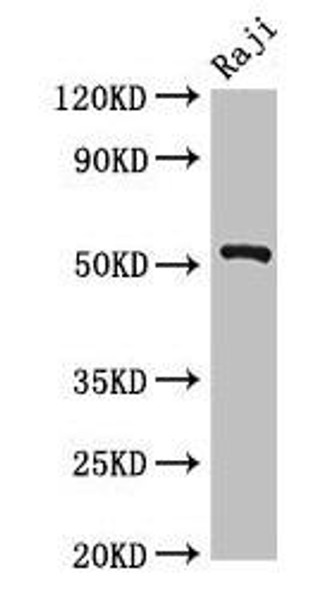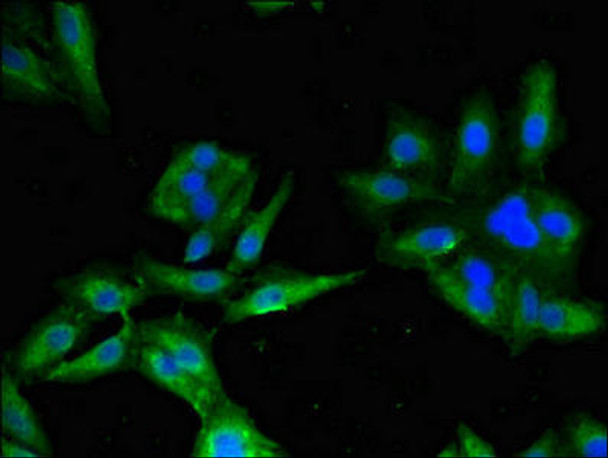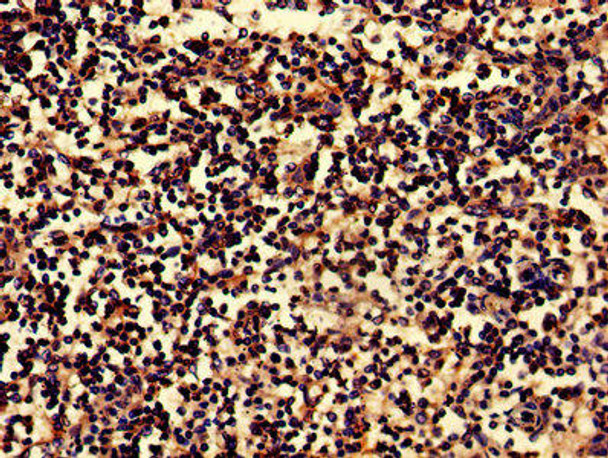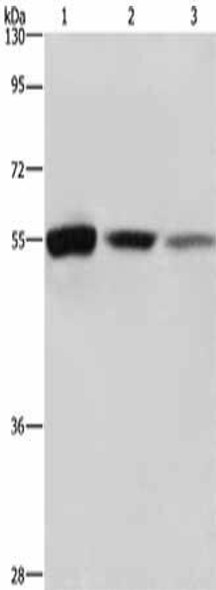Description
BLNK Antibody (PACO52626)
The BLNK Polyclonal Antibody (PAC052626) is a vital tool for researchers studying B cell receptor signaling pathways. This antibody, generated in rabbits, has shown high specificity and sensitivity in detecting BLNK protein in human samples through Western blot analysis. BLNK, also known as B cell linker protein, is a key adaptor molecule that plays a crucial role in transmitting signals from the B cell receptor to downstream effector molecules.Studies have shown that BLNK deficiency or dysfunction can impair B cell activation and antibody production, leading to immune system dysfunction. This antibody allows for the precise detection and quantification of BLNK levels in various cell types, aiding researchers in understanding the mechanisms behind B cell receptor signaling and the development of B cell-related diseases such as leukemia and autoimmune disorders.
With its proven reactivity and reliability in Western blot applications, the BLNK Polyclonal Antibody is an essential tool for investigating the intricate signaling pathways involved in B cell activation and immune response modulation. Researchers in immunology, oncology, and autoimmune disease fields will find this antibody invaluable for their studies into B cell biology and potential therapeutic targets.
| Antibody Name: | BLNK Antibody (PACO52626) |
| Antibody SKU: | PACO52626 |
| Size: | 50ug |
| Host Species: | Rabbit |
| Tested Applications: | ELISA, WB, IHC, IF |
| Recommended Dilutions: | ELISA:1:2000-1:10000, WB:1:500-1:5000, IHC:1:500-1:1000, IF:1:50-1:200 |
| Species Reactivity: | Human |
| Immunogen: | Recombinant Human B-cell linker protein (41-337AA) |
| Form: | Liquid |
| Storage Buffer: | Preservative: 0.03% Proclin 300 Constituents: 50% Glycerol, 0.01M PBS, pH 7.4 |
| Purification Method: | >95%, Protein G purified |
| Clonality: | Polyclonal |
| Isotype: | IgG |
| Conjugate: | Non-conjugated |
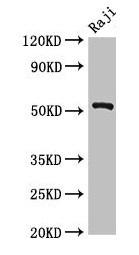 | Western Blot. Positive WB detected in: Raji whole cell lysate. All lanes: BLNK antibody at 2.7µg/ml. Secondary. Goat polyclonal to rabbit IgG at 1/50000 dilution. Predicted band size: 51, 49, 45 kDa. Observed band size: 51 kDa. |
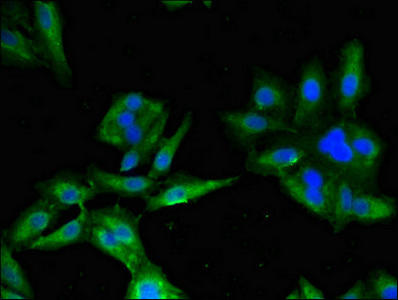 | Immunofluorescent analysis of Hela cells using PACO52626 at dilution of 1:100 and Alexa Fluor 488-congugated AffiniPure Goat Anti-Rabbit IgG(H+L). |
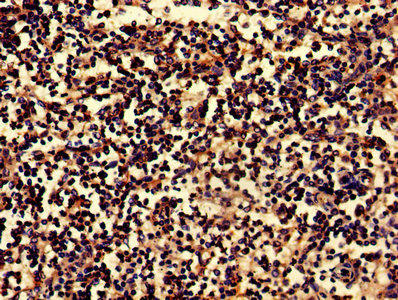 | IHC image of PACO52626 diluted at 1:800 and staining in paraffin-embedded human spleen tissue performed on a Leica BondTM system. After dewaxing and hydration, antigen retrieval was mediated by high pressure in a citrate buffer (pH 6.0). Section was blocked with 10% normal goat serum 30min at RT. Then primary antibody (1% BSA) was incubated at 4°C overnight. The primary is detected by a biotinylated secondary antibody and visualized using an HRP conjugated SP system. |
| Background: | Functions as a central linker protein, downstream of the B-cell receptor (BCR), bridging the SYK kinase to a multitude of signaling pathways and regulating biological outcomes of B-cell function and development. Plays a role in the activation of ERK/EPHB2, MAP kinase p38 and JNK. Modulates AP1 activation. Important for the activation of NF-kappa-B and NFAT. Plays an important role in BCR-mediated PLCG1 and PLCG2 activation and Ca(2+) mobilization and is required for trafficking of the BCR to late endosomes. However, does not seem to be required for pre-BCR-mediated activation of MAP kinase and phosphatidyl-inositol 3 (PI3) kinase signaling. May be required for the RAC1-JNK pathway. Plays a critical role in orchestrating the pro-B cell to pre-B cell transition. May play an important role in BCR-induced B-cell apoptosis. |
| Synonyms: | B-cell linker protein (B-cell adapter containing a SH2 domain protein) (B-cell adapter containing a Src homology 2 domain protein) (Cytoplasmic adapter protein) (Src homology 2 domain-containing leukocyte protein of 65 kDa) (SLP-65), BLNK, BASH SLP65 |
| UniProt Protein Function: | BLNK: an adaptor protein that bridges the B-cell receptor-associated kinases (BCR) with a multitude of signaling pathways, regulating biologic outcomes of B-cell function and development. Plays an important role in BCR-mediated PLCG1 activation and Ca(2 ) mobilization. Does not seem to be not required for pre-BCR-mediated activation of MAP kinase and phosphatidyl-inositol 3 (PI3) kinase signaling. Plays a critical role in orchestrating the pro-B cell to pre-B cell transition. Following BCR activation, phosphorylated on tyrosine residues by SYK and LYN. When phosphorylated, serves as a scaffold to assemble downstream targets of antigen activation, including PLCG1, VAV1, GRB2 and NCK1. Its phosphorylation is required for both Ca(2 ) and MAPK signaling pathways. Defects in BLNK are the cause of hypoglobulinemia and absent B-cells.It has tumor supressor activity that is lost in many cases of childhood pre-B acute lymphoblastic leukemia (ALL). Two alternatively spliced isoforms have been described; these are differentially involved in activation and apoptosis of B lymphocytes. |
| UniProt Protein Details: | Protein type:Adaptor/scaffold Chromosomal Location of Human Ortholog: 10q23.2-q23.33 Cellular Component: cytoplasm; cytosol; plasma membrane Molecular Function:protein binding; SH3/SH2 adaptor activity; transmembrane receptor protein tyrosine kinase adaptor protein activity Biological Process: humoral immune response; inflammatory response Disease: Agammaglobulinemia 4, Autosomal Recessive |
| NCBI Summary: | This gene encodes a cytoplasmic linker or adaptor protein that plays a critical role in B cell development. This protein bridges B cell receptor-associated kinase activation with downstream signaling pathways, thereby affecting various biological functions. The phosphorylation of five tyrosine residues is necessary for this protein to nucleate distinct signaling effectors following B cell receptor activation. Mutations in this gene cause hypoglobulinemia and absent B cells, a disease in which the pro- to pre-B-cell transition is developmentally blocked. Deficiency in this protein has also been shown in some cases of pre-B acute lymphoblastic leukemia. Alternatively spliced transcript variants have been found for this gene. [provided by RefSeq, May 2012] |
| UniProt Code: | Q8WV28 |
| NCBI GenInfo Identifier: | 82592659 |
| NCBI Gene ID: | 29760 |
| NCBI Accession: | Q8WV28.2 |
| UniProt Secondary Accession: | Q8WV28,O75498, O75499, Q2MD49, |
| UniProt Related Accession: | Q8WV28 |
| Molecular Weight: | 44,451 Da |
| NCBI Full Name: | B-cell linker protein |
| NCBI Synonym Full Names: | B-cell linker |
| NCBI Official Symbol: | BLNK |
| NCBI Official Synonym Symbols: | bca; AGM4; BASH; LY57; SLP65; BLNK-S; SLP-65 |
| NCBI Protein Information: | B-cell linker protein |
| UniProt Protein Name: | B-cell linker protein |
| UniProt Synonym Protein Names: | B-cell adapter containing a SH2 domain protein; B-cell adapter containing a Src homology 2 domain protein; Cytoplasmic adapter protein; Src homology 2 domain-containing leukocyte protein of 65 kDa; SLP-65 |
| Protein Family: | B-cell linker protein |
| UniProt Gene Name: | BLNK |
| UniProt Entry Name: | BLNK_HUMAN |
| Secondary Antibody |
| Anti-HRP Goat Anti-Rabbit IgG (H+L) Antibody (CABS014) |
| Recommended Products |
| Anti-FITC Goat Anti-Rabbit IgG (H+L) Antibody (CABS011) |
| Anti-HRP-conjugated Beta Actin Antibody (CABC028) |

